By Wayne Gillam | UW ECE News
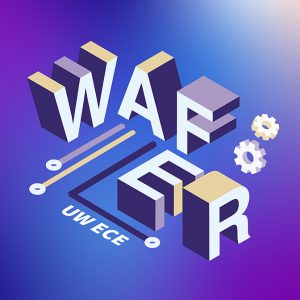
WomXn at the Forefront of ECE Research (WAFER) showcases research by women and nonbinary people in ECE and related fields. The event will be held Tuesday, Nov. 7, from 11:30 a.m. to 8 p.m. in the ECE building on the UW campus. Illustration by Jasmine Yuan | UW ECE
On Tuesday, Nov. 7, the University of Washington Department of Electrical & Computer Engineering will host WomXn at the Forefront of ECE Research (WAFER), a day-long event held in the Department once every two years. WAFER showcases research by women and nonbinary people in electrical and computer engineering and related fields and discusses their experiences in academia and the workplace. This biennial event at UW ECE provides an opportunity for participants and speakers alike to share and learn from each other. It is the second time WAFER has been held in the Department. The first was in 2021, during the COVID-19 pandemic. That inaugural event took place in a hybrid in-person/online format whereas WAFER in 2023 will be fully in-person and offer more networking opportunities.
This year’s event will be held in the ECE building on the UW campus. WAFER will begin with a check-in at 11:30 a.m. followed at Noon with welcoming remarks by UW ECE Professor and Chair Eric Klavins and Azadeh Yazdan, who is the Washington Research Foundation Associate Professor of Neuroengineering in UW ECE and the UW Department of Bioengineering. After their remarks will be talks by keynote speakers Dr. Emily Mugler, a neural engineering research manager at Meta and Dr. Vaishnavi Ranganathan, a senior researcher at Microsoft and affiliate assistant professor at UW ECE. Ranganathan is also a UW ECE alumna, having received her doctoral degree from the Department in 2018. Mugler and Ranganathan will talk about their current research and experiences they have had connecting their research to industry.
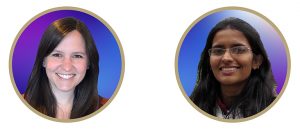
WAFER keynote speakers are Dr. Emily Mugler (left), a neural engineering research manager at Meta and Dr. Vaishnavi Ranganathan (right), a senior researcher at Microsoft and affiliate assistant professor at UW ECE.
WAFER includes panels, workshops, presentations, and discussions, as well as a scientific poster session presented by undergraduate, graduate, and postdoctoral students. The event is organized and co-chaired by UW ECE doctoral students Amber Chou and Shanti Garman. Garman is a co-founder of WAFER and was also co-chair of the 2021 event. WAFER is aimed at people studying and working in ECE and related fields, but it is open to the UW community and the public.
To view a complete schedule and register to attend, visit the WAFER webpage.
Below is a list of common questions about WAFER. Answers are from a recent interview with Chou and Garman:
What is the purpose of WAFER?
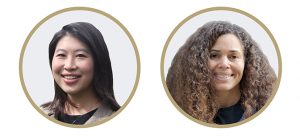
WAFER Co-Chairs are UW ECE doctoral students Amber Chou (left) and Shanti Garman (right). Garman is a co-founder of WAFER.
WAFER puts a spotlight on research by women and nonbinary people in ECE and related fields and shares this work with the wider community. The event includes undergraduate, graduate, and postdoctoral students as well as faculty and industry leaders. It also provides an opportunity for participants and speakers at different stages in their careers to discuss their academic and work experiences and learn from each other. It is our hope that students attending this year’s event will be inspired to pursue a career in ECE or another tech-related field.
An important reason for holding WAFER is that it creates an opportunity for networking, community building, and fostering a sense of belonging. We’ve noticed that there are several women and nonbinary people in our Department doing interesting research, but many only have a passing familiarity with each other because researchers tend to stay in the lab. WAFER gives us all an opportunity to get out of the lab, meet, and learn about each other’s work.
What does the word “WomXn” mean, and how is it pronounced?
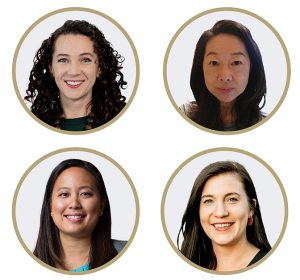
The WAFER industry panel features four outstanding technology leaders: Dr. Megan Brewster, the vice president of advanced technology at Impinj, Leigh Huang, a senior director of program management at Microsoft, Emily Vetterick, director of Amazon Global Robotics, and Angela Li, the 737 MAX systems development director at Boeing.
We use the letter “X” in the event title to be explicit that we’re including nonbinary people in WAFER. “WomXn” is pronounced the same as the word “women,” but it is more inclusive in that it means both “women and nonbinary people.” When we were considering names for this event, we did some research, looking into what names and words were most used and preferred by underrepresented communities. When it came to women and nonbinary people, we learned about the word “womxn,” and discovered that it was an inclusive term that nonbinary people preferred.
The language around diversity, equity and inclusion is evolving rapidly, so this title is not set in stone, and we’re not necessarily staying with it for future events. The point of our work is to showcase research and discuss the experiences of women and nonbinary people, so we plan to evolve as the community changes. Most importantly, we want those from underrepresented groups to feel invited and included. Using the word “WomXn” in the event title is meant to reflect that intention.
Who should attend WAFER?
This event is for all undergraduate, graduate, and postdoctoral students in ECE and related fields, as well as for engineering faculty, staff, alumni, and people from industry. The event is also open to the wider UW community and to the public. We really want everyone who can to attend, including males and people from other departments because we want them to hear about the interesting research and experiences of the speakers and panelists.
Why should people attend?
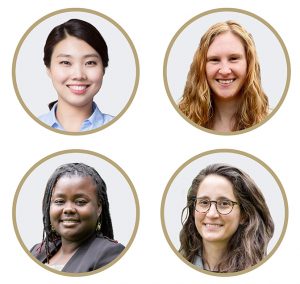
WAFER faculty panelists are (clockwise from top left) UW ECE assistant professors Jungwon Choi, Kim Ingraham, June Lukuyu, and Sara Mouradian.
WAFER is a platform for women and nonbinary people to showcase their research and it is built to provide unique opportunities for networking and community building. We invited a lot of faculty and leaders from industry and academia, so students can talk with them, and there will be people attending from different departments too. For students presenting their research at WAFER, it can be an opportunity to sharpen scientific communication and presentation skills.
This is a broad, expansive, and engaging event. For the student who is not sure whether they want to go into industry or wonder what it even looks like to do research in industry or to become a faculty member — they can get some questions answered. And for everyone there are opportunities to learn about the obstacles and challenges facing women and nonbinary people. This event also provides information about how everyone can help to remove those obstacles, so there is much to be learned by attending, whether you are from an underrepresented group or not.
Can you describe WAFER’s student, faculty and industry panels?
The student panel is moderated by UW graduate student Weijia Shi and undergraduate student Dilini Nissanka. The panel is a mix of undergraduate and graduate students who will share their research experiences at UW ECE. It provides a great opportunity for students to listen to and learn from their peers.
The faculty panel is moderated by Amy Orsborn, a Clare Boothe Luce Assistant Professor in Electrical & Computer Engineering and Bioengineering. The panel is made up of four of our newest faculty members in the Department, assistant professors Jungwon Choi, Kim Ingraham, June Lukuyu, and Sara Mouradian. They will talk about their research and experiences, and there will be time for questions, discussion, and socializing.
The industry panel is moderated by Maryam Fazel, the Moorthy Family Career Inspiration Development Professor in UW ECE. The panel features four outstanding technology leaders: Dr. Megan Brewster, the vice president of advanced technology at Impinj, Leigh Huang, a senior director of program management at Microsoft who is a UW ECE alumna (BSEE), Emily Vetterick, director of Amazon Global Robotics, and Angela Li, the 737 MAX systems development director at Boeing and a UW ECE alumna (BSEE, ‘08, MSEE ‘10). Li also serves as the Boeing Executive Focal for UW ECE and is a member of the UW ECE Advisory Board. These four women will talk about their experiences in industry. Like the other panels, there will be time set aside for questions, discussion and getting to know each other.
Can you describe this year’s event workshop?
This year’s workshop is titled “Sex, Gender, and Engineering,” and it will be led by UW ECE Professor Denise Wilson, who is the associate chair for diversity, equity, and inclusion in the Department. She teaches an ECE course by the same name and has co-authored a book on the subject. Like the course, this workshop will explore professional issues faced by women, nonbinary and LGBTQ+ people in the workplace. The workshop will provide an overview of the obstacles and challenges people from these underrepresented groups face in their careers. There will also be time for questions and discussion. We think this workshop is an important part of the event for everyone to attend, whether you are from an underrepresented group or not.
Who should students contact to present their research at WAFER?
The deadline for submitting scientific posters was October 18, but we are still accepting entries. We just require students to print their own posters at this point. Contact Shanti Garman or Amber Chou for more information.
What’s next for WAFER?
One thing that we have in mind is making WAFER part of a larger committee or group at UW ECE that has ongoing connections and programming for women and nonbinary people in ECE and related fields. We are currently in talks with UW ECE leadership about this. Another thing that we would like to implement in the future is establishing outreach to local community colleges and high school students. That way, we can be offering the event as a resource to students throughout every segment of the education pipeline.
How can people get involved with WAFER?
We’d love to get more people involved in WAFER! There are several different ways people can participate. For example, they could join the organizing committee for future WAFER events; propose follow-up, DEI-related events after WAFER is over and help to plan and organize them; or participate in community-building events, such as the UW ECE graduate student coffee chats and UW ECE socials. Those who are interested should contact Shanti Garman or Amber Chou for more information.

